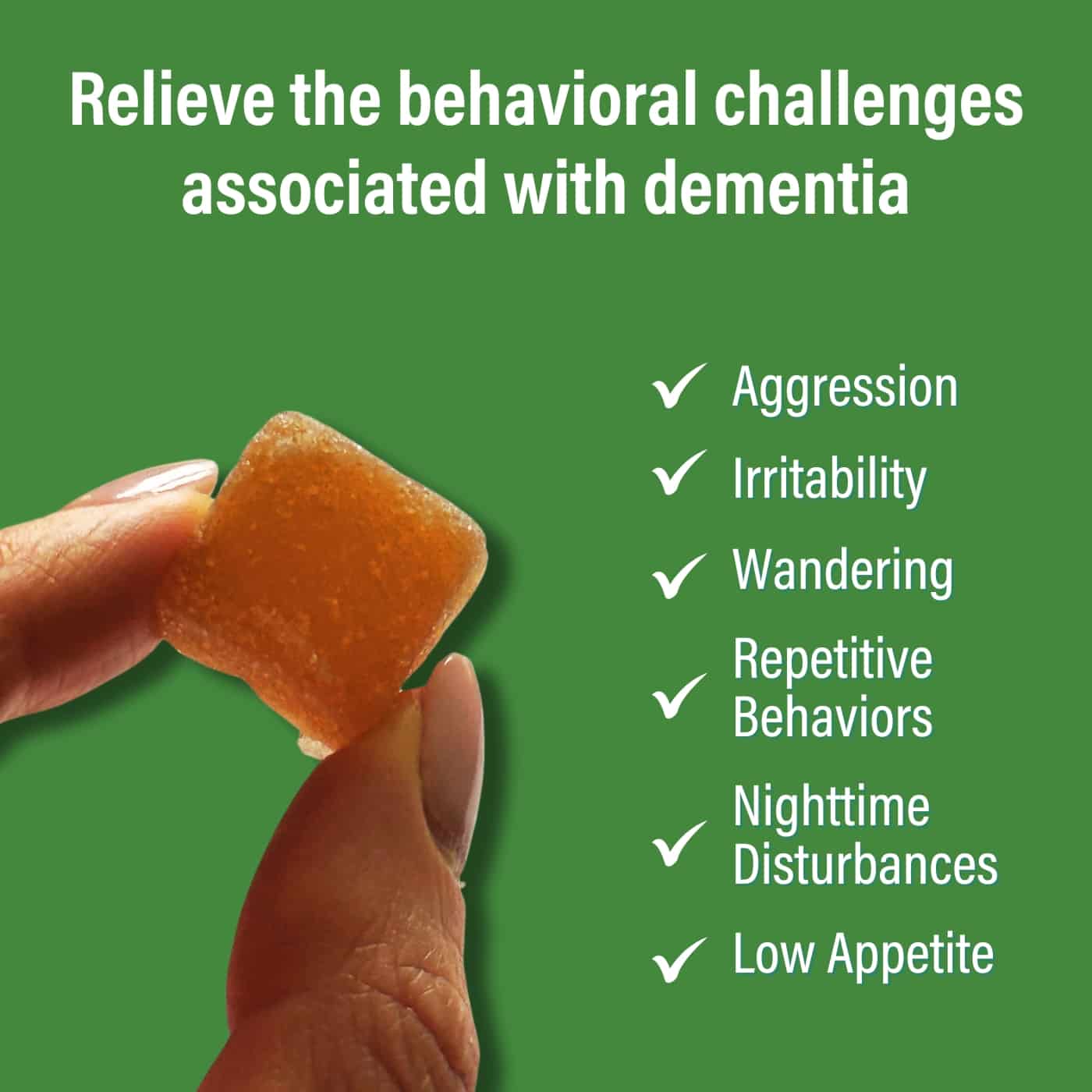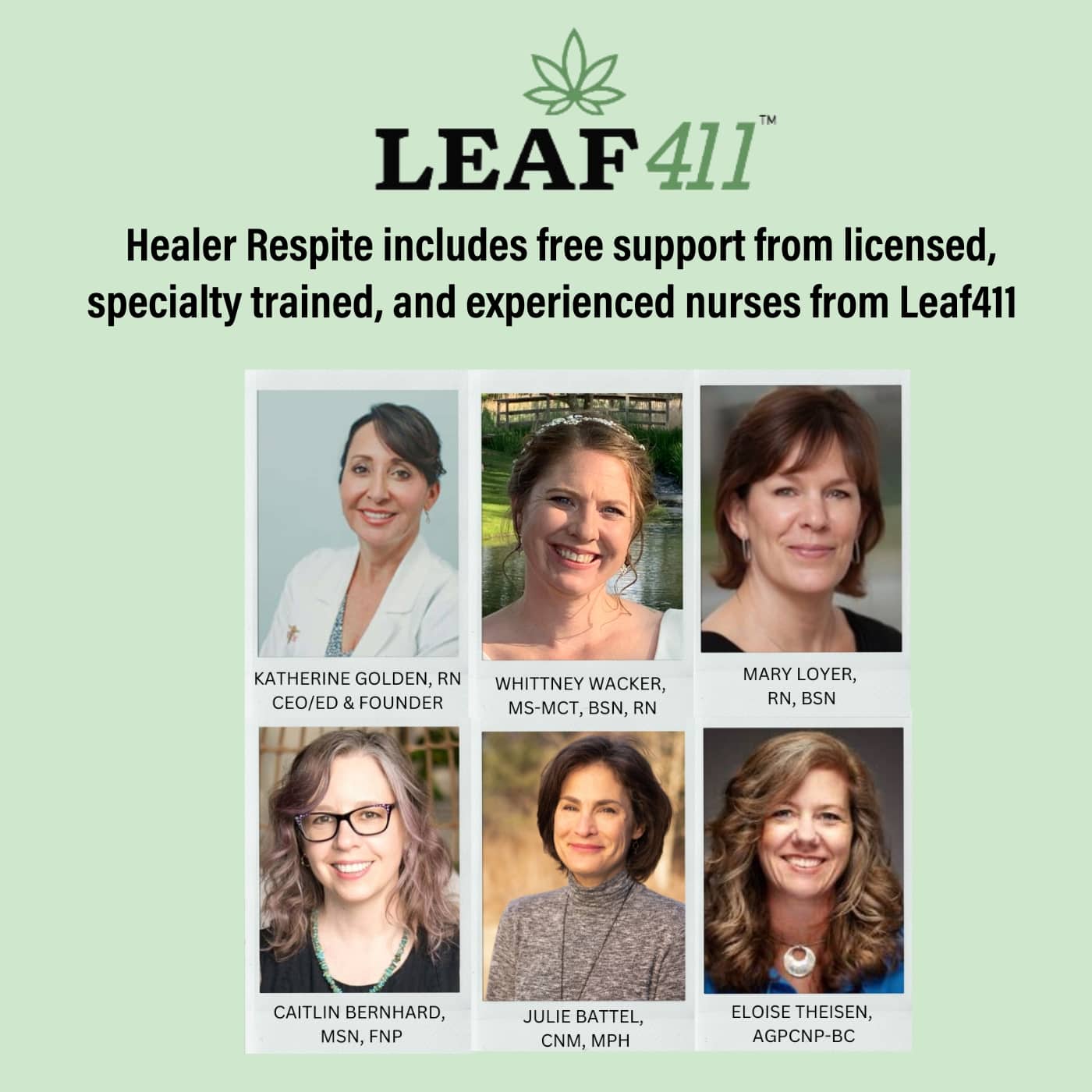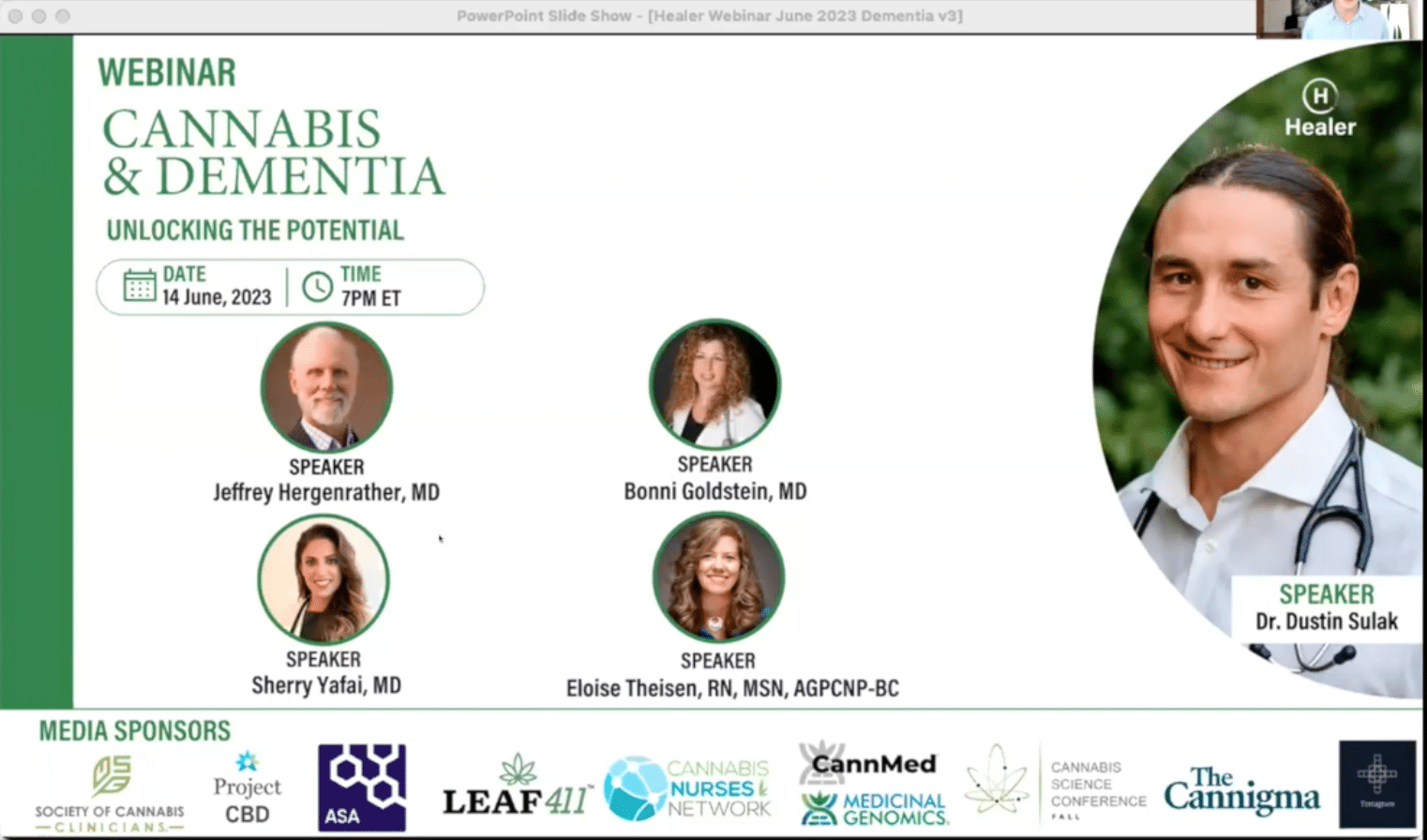Healer Respite has been formulated based on the clinical experience of Dr. Dustin Sulak and other expert cannabis clinicians, and based on clinical trials that have examined the use of cannabinoids in the treatment of dementia-related symptoms. Since Healer Respite is a new product, we are still gathering data related to the safety and efficacy of this specific formulation.
Clinical studies that have used similar or higher doses of THC and other cannabinoids in patients with behavioral challenges associated with dementia have demonstrated excellent safety and tolerability. For example, a pilot study from Israel saw minimal adverse effects in patients treated with Delta 9 THC twice daily in the range of 2.5 – 7.5 mg over 4 weeks.[i] A larger placebo-controlled trial from Israel in which patients received an average dose of THC 7.4 mg + CBD 175.8 mg three times daily found no difference in side effects among those who received cannabis and those who received placebo.[ii]
Studies on other cannabinoid products have found improvements in several symptoms in dementia patients with behavioral challenges, including:
- Quality of life[iii]
- Behavioral symptoms like agitation[iv] and aggression[v]
- Pain[vi]
- Worry[vii]
- Sleep disturbance and nighttime wandering[viii]
- Low appetite and weight loss[ix]
- Stiffness and rigidity[x]
- Cognitive decline[xi]
- Caregiver distress[xii]
[i] Shelef, Assaf, et al. “Safety and efficacy of hemp oil for behavioral and psychological symptoms of dementia: an-open label, add-on, pilot study.” Journal of Alzheimer’s disease 51.1 (2016): 15-19.
[ii] Hermush, Vered, et al. “Effects of rich hemp oil on behavioral disturbances in dementia patients: A placebo controlled randomized clinical trial.” Frontiers in Medicine 9 (2022): 951889.
[iii] Pautex, Sophie, et al. “Cannabinoids for behavioral symptoms in severe dementia: Safety and feasibility in a long-term pilot observational study in nineteen patients.” Frontiers in Aging Neuroscience 14 (2022): 957665.
[iv] Hermush, Vered, et al. “Effects of rich hempl oil on behavioral disturbances in dementia A placebo controlled randomized clinical trial.” Frontiers in Medicine 9 (2022): 951889.
[v] Woodward, Matthew R., et al. “Dronabinol for the treatment of agitation and aggressive behavior in acutely hospitalized severely challenged dementia patients with noncognitive behavioral symptoms.” The American Journal of Geriatric Psychiatry 22.4 (2014): 415-419.
[vi] Flávio Henrique de Rezende Costa., et al. “Dementia patients Under Treatment with Standardized Extracts Enriched in hemp compounds: Descriptive Observations in Preparation for a Phase 2a Clinical Trial”.EC Neurology 14.5 (2022): 01-15.
[vii] Flávio Henrique de Rezende Costa., et al. “Dementia Patients Under Treatment with Standardized Extracts Enriched in hemp compounds:: Descriptive Observations in Preparation for a Phase 2a Clinical Trial”.EC Neurology 14.5 (2022): 01-15.
[viii] Walther, Sebastian, et al. “Delta9 for nighttime agitation in severe dementia.” Psychopharmacology 185 (2006): 524-528.
[ix] Volicer, Ladislav, et al. “Effects of dronabinol on anorexia and disturbed behavior in patients with Alzheimer’s disease.” International journal of geriatric psychiatry 12.9 (1997): 913-919.
[x] Broers, Barbara, et al. “Prescription of a Hemp-based medication to dementia patients: a pilot study in Geneva.” 2.1 (2019): 56-59.
[xi] Palmieri, Beniamino, and M. Vadalà. “Oral hemp extract in main symptoms of dementia with agitation and weight loss.” La Clinica Terapeutica 174.1 (2023).
[xii] Palmieri, Beniamino, and M. Vadalà. “Oral hemp extract in main symptoms of dementia agitation and weight loss.” La Clinica Terapeutica 174.1 (2023).
No. While we recommend that you discuss the use of Healer Respite Gummies with your medical provider(s) before you start, you do not need a prescription to try Healer Respite. Individuals who reside in a long-term care facility may need their doctor to provide a “medication order,” similar to what’s required to approve the administration of other non-prescriptions vitamins or supplements.
- Purchase Healer Respite online
- No prescription required.
- Receive products in the mail within 3-5 days
- Follow simple steps and track results
- Get monthly shipments. Cancel anytime.
Have questions or need support? Contact our trained staff 207-271-9333.
The side effects of Healer Respite are typically mild, and for some, may be beneficial: feeling tired and increased appetite are two common examples. When people take an excessive amount of Healer Respite (more than one serving at a time), or if they start stage 2 products before a full trial of stage 1, they may experience dizziness, euphoria, dry mouth, or worsening of their current symptoms like confusion and agitation. The formulation and design of Healer Respite in blister packaging and two stages of treatment reduce the risk of accidental over use and adverse effects.
Like many other botanical supplements, hemp products can affect the activity of pharmaceutical medications. People taking medications should discuss hemp products with their medical provider prior to taking them.
There are several online drug interactions checkers that can be used by patients and medical providers to evaluate a potential interaction with THC and CBD, the two most common cannabinoids found in hemp products. One tool produced by Penn State University College of Medicine is available to the public: https://cann-dir.psu.edu/ When “THC/CBD” is entered as the therapeutic class, and one’s other medications are entered, the report will indicate whether the cannabinoids could make the effect of each drug stronger, weaker, or both.
It’s important to note that these databases simply alert the user to a potential interaction. The likelihood of an interaction occurring increases with higher doses of hemp-based cannabinoids, higher doses of the medication, and the combination of multiple medications. Healer Respite gummies all contain less than 20 mg of total cannabinoids per serving, which is generally considered a low amount with low risk of drug interactions. In one long-term study of 19 elderly patients with behavioral challenges who took an average of 40 mg total cannabinoids per day, researchers tested subjects’ ability to metabolize drugs, which were only slightly altered; no critical drug interactions were identified.[i]
Blood pressure medications:
Cannabinoids have the potential to lower blood pressure, though with low doses taken orally the effect is usually small. People who are taking blood pressure drugs, especially those on multiple agents and those with a current blood pressure that is borderline low, should use caution when adding Healer Respite.
Blood thinner medications:
Cannabinoids can increase or decrease the effects of various blood thinners. People taking warfarin (Coumadin) should have their INR checked after starting hemp products and may need to adjust their dose of warfarin. People taking clopidogrel (Plavix) may have reduced activity of the drug when taken with hemp. Interactions with other blood thinners are also possible, but thus far, the only published case reports of interactions with blood thinners have occurred with people taking warfarin.
Cholesterol medications:
Cannabinoids may increase the activity of statin medications used to lower cholesterol. This may be an important interaction for people taking the maximum dose of these medications or for people that are already experiencing statin-related adverse effects like muscle pain and headache.
Pain Medications:
Cannabinoids can make the pain relieving and sedating effects of opioid pain relievers stronger when taken together, but the combination does not increase the dangerous side effects like slowing the heart or breathing rates. Combining cannabinoids and opioids often allow people to take lower doses of opioids, but we strongly encourage you to talk to your prescriber before lowering your dose.
Anxiety and sleep medications:
Cannabinoids can increase the power of benzodiazepine anxiety and sleep medications, potentially making them more impairing and increasing the risk of a fall, but often allowing people to use less of these medication. Again, we strongly encourage you to talk to your prescriber before lowering your dose.
Antidepressant medications:
While some potential interactions between cannabinoids and various antidepressants exist, these have not been reported clinically and it is considered safe to use them with hemp products. The tricyclic class of antidepressant drugs (e.g. amitriptyline) have anticholinergic properties
Common Alzheimer’s medications:
Cannabinoids are unlikely to affect the activity of memantine (Namenda); they may increase or decrease the effects of donepezil (Aricept), but the impact is unlikely to be clinically relevant.
[i] Pautex, Sophie, et al. “Cannabinoids for behavioral symptoms in dementia: Safety and feasibility in a long-term pilot observational study in nineteen patients.” Frontiers in Aging Neuroscience 14 (2022): 957665.
People with a known allergy to cannabis or any of the ingredients used to make Healer Respite should not use the product. People with a history of adverse effects with inhaled or edible THC-dominant cannabis products should use with caution but are often able to use Healer Respite due to the low content of THC (<3 mg per serving in stage 1).
Most people will begin to see improvements in less than two weeks, and some people experience improvements almost immediately. The benefits usually grow over time, so someone with good results after a 2-4 weeks are likely to have even better results after 3 months. For people who have limited or no benefit after using the stage 1 formula for two weeks, we recommend proceeding to stage 2, a stronger formula.
We encourage you to provide your doctor with a copy of Healer Respite: Clinician Guide. This document will help them understand the potential benefits and risks of a trial of Healer Respite.
Healer is happy to provide our customers with support to answer your questions about your use of Healer Respite, or whether a trial of Healer Respite may be right for you and your loved one. We partner with Leaf411, a network of nurses with expertise in cannabis to provide ongoing phone support. You can also look for a cannabis clinician in your area that can work with you and the rest of your healthcare team via the Society of Cannabis Clinicians practitioner directory https://www.cannabisclinicians.org/find-a-cannabis-doctor/
The active components of Healer Respite work on several targets in the body, including the endocannabinoid system, to produce symptomatic improvements for agitation, aches, discomfort, worry, mood and sleeplessness, in appetite and quality of life.
Beyond symptom relief, it is possible that Healer Respite could address some of the underlying problems present in elderly people with behavioral challenges. A variety of compounds present in cannabis/hemp, including cannabinoids, terpenoids, and flavonoids, have been shown in preclinical (cell and animal) studies to have activity that could directly impact causes of the challenges. These include inflaming, neuroprotective, antioxidant, Beta amyloid reducing, and tau protein reducing activities.[i]
[i] Steiner-Lim, Genevieve Z., et al. “Medicinal Cannabis for Alzheimer’s Disease.” Medical Cannabis and the Effects of Cannabinoids on Fighting Cancer, Multiple Sclerosis, Epilepsy, Parkinson’s, and Other Neurodegenerative Diseases. IGI Global, 2023. 1-47.
For a facility to administer Healer Respite Gummies, they will need a standing order from your attending clinician like any other supplement. The facility and clinician should understand that hemp is a federally legal product and that your loved one has the right to access it similar to any other supplement. Healer will work with you, your clinician, and facility to educate them on the products and how to use them appropriately.
- Contact Us
- No prescription required.
- A Healer representative will contact you to provide assistance via educational materials and phone support.
- When you are ready, order Healer Respite for a 90-day trial. Cancel anytime.
Have questions or need support? Contact our trained staff 207-271-9333.
Short answer: when it’s derived from hemp naturally in concentrations of less than 0.3% by dry weight, yes!
In 2018 Congress passed the 2018 Farm Bill, which removed hemp as a federally controlled substance. It also says that any hemp and hemp-derived products that contain less than 0.3% Delta 9 by dry weight are considered federally legal in the United States. By this definition, all of our Delta-9 THC products are federally compliant under the standards set by the 2018 Farm Bill.
Healer Gummies contain naturally derived Delta-9 THC from complaint hemp us grown plants.
- One Gummy contains weighs about 4.7 grams, or 4700 milligrams.
- If we take 0.003 (which is 0.3%) and multiply that by 4700, we are left with 14 milligrams.
- That means that according to the 2018 Farm Bill, a 4.7 gram gummy can contain up to 14 mg of hemp-derived Delta-9 THC.
- We formulated our Gummies with only 2 – 5 mg of Delta 9, which means the amount of Delta 9 we use in our gummies is well below the legal amount of 0.3%.2mg = 0.04%
5mg = 0.1%
Not for sale where Delta-9 THC is prohibited by law including these states: AZ, IA, ID, MN, NE, NY, OR, SD, VA
Healer Respite Gummies are adult use only 21+.
Some restrictions may apply.
Check your local laws before purchase.





